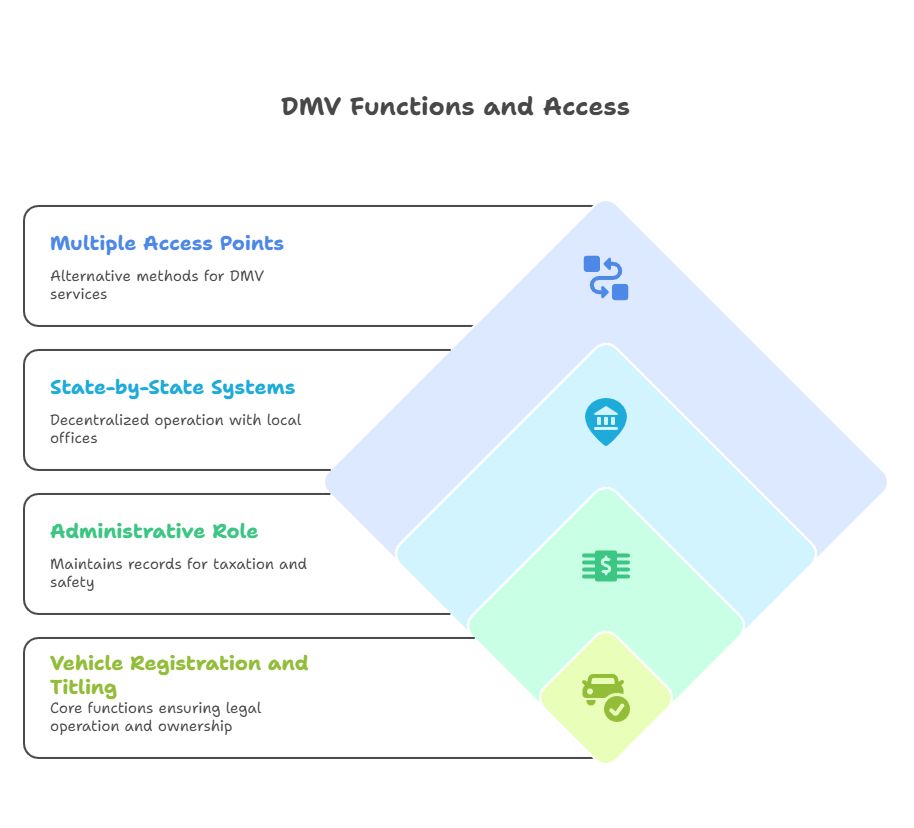Most people assume that the Department of Motor Vehicles (DMV) is the only authority when it comes to registering and titling cars. It’s the default image—long lines, stacks of paperwork, and a state employee behind the counter stamping your forms. But here’s the truth: while the DMV plays a central role, it doesn’t have to be the sole gatekeeper of your vehicle’s paperwork.
This raises an important question: Does the DMV really have to control registration and titling, or are there other options available?
The answer is more flexible than most drivers realize. In fact, states across the country already allow certain processes to take place outside the DMV itself—whether through dealerships, county offices, or online systems. In this article, we’ll break down what the DMV actually does, why it exists in its current form, and how alternative models are already proving that drivers don’t have to rely exclusively on one government office to keep their cars compliant.
What Does the DMV Actually Do?

Vehicle Registration and Titling Basics
At its core, the DMV is responsible for two primary functions: vehicle registration and vehicle titling. Registration is the process that makes your car compliant to drive on public roads, while titling establishes who owns the vehicle. Without these documents, you can’t operate or transfer ownership of a car.
Administrative Nature
The DMV’s role is more administrative than authoritative. It isn’t about granting you permission to drive so much as maintaining accurate records. Registration ensures that every car on the road is tied to an owner for purposes like taxation, law enforcement, and public safety. Titling, on the other hand, protects ownership rights, creating a paper trail that helps prevent theft, fraud, and disputes over who really owns a vehicle.
State-by-State Systems
It’s worth noting that the DMV isn’t a single nationwide entity. Each state runs its version of the system, and the level of centralization varies. In many places—like Colorado, New York, and California—local or county offices actually handle a large portion of the work, operating under the DMV’s framework. This means drivers don’t always interact with a central state agency; instead, they work with a local branch that follows statewide rules.
Multiple Access Points
Beyond the physical DMV office, states also provide a range of access points. You can often complete renewals or new registrations online, by mail, or directly through dealerships. In some cases, especially with new car purchases, the dealer handles the paperwork entirely and files it with the state on your behalf. These alternatives highlight a critical point: even within the current system, the DMV isn’t always the only player in the process.

Why the DMV Doesn’t Have to Control the Process
Historic Convenience, Not Necessity
The DMV’s dominance in vehicle registration and titling is less about law and more about convenience. States adopted this model decades ago because it centralized paperwork under one agency, streamlining tax collection and recordkeeping. But there is no federal mandate that requires every state to use a DMV or an equivalent agency. In theory, states could contract private companies, empower local offices, or create new digital systems—as long as they meet federal requirements for ownership tracking and safety records. The DMV’s control exists by tradition, not because it’s the only acceptable option.
Technology & Alternatives Emerging
Advancements in technology have made it easier than ever to rethink how registration and titling work. Secure online systems already allow many states to process renewals or new registrations without a single trip to a government office. Looking forward, tools like blockchain-based titles and digital IDs could make the process more transparent and harder to tamper with. Some states are already moving in this direction. For example, in Colorado, dealerships can complete the titling and registration process on-site when you buy a car, with the DMV serving more as a recordkeeper than a frontline service provider.
Policy Flexibility
The real flexibility lies in how laws are written. State statutes generally outline what procedures must be followed to register or title a vehicle, but they rarely specify which agency has to perform them. That’s why some classes of vehicles—like specialty cars, historic vehicles, or kit cars—often go through entirely different channels. In many cases, these vehicles are processed by alternative offices or follow tailored procedures, proving that states can adapt their systems when it makes sense.
Section 3: Proof that Alternatives Already Exist
Dealership Registration
In many states, when you purchase a car from a dealer, you never set foot in a DMV office. Dealerships are authorized to handle the paperwork directly, issuing temporary tags and filing the registration and title with the state. This not only saves consumers time but also shows that the DMV doesn’t have to control every transaction—it can delegate.
County-Based and Regional Offices
Some states decentralize even further by giving county or municipal governments the authority to process registrations and titles. In these cases, the DMV sets policy, but the execution happens locally. This regional approach makes services more accessible while keeping the state’s record system intact.
Specialty and Nontraditional Vehicles
Unconventional vehicles often bypass the DMV entirely. Kit cars, classic or historic cars, and even military surplus vehicles may have specialized registration processes that route through alternative state agencies or specialized units. These exceptions highlight the fact that states are already comfortable with flexible systems when the standard DMV process doesn’t fit.
Real Client Example: Solving a No-Title Problem
Got an older vehicle with no title? You’re not alone. Many specialty, classic, or inherited cars don’t fit neatly into the DMV’s standard process. Here’s how Dirt Legal helped one customer secure a bonded title and get their vehicle fully road-ready.
Online Portals
Digital platforms are another example of the DMV stepping back from its traditional role. States like Colorado, New York, and California offer robust online portals where residents can register vehicles, renew plates, or transfer titles without ever setting foot in an office. These tools prove that a physical DMV location isn’t always necessary—the process can be secure, efficient, and fully digital.
The Bigger Picture – Why This Matters
DMV = Administrative, Not Authoritative
The most important point to remember is that the DMV is an administrative body, not an authority by law. Its job is to keep records, not to monopolize how registration and titling are carried out. States already delegate parts of this process to dealerships, counties, and even online platforms. That means states also hold the power to redesign or expand the system entirely if it benefits drivers. The DMV doesn’t have an exclusive claim—it’s simply the framework states have used for decades.
No Federal Law Requires a DMV Monopoly
There’s a common misconception that federal law requires every driver to interact with a DMV. In reality, no federal statute demands that one agency control the process. What matters is that the chain of ownership is documented, safety regulations are enforced, and taxation is properly collected. Beyond that, states have wide latitude to innovate. This is why you see variations across the country—some states rely heavily on the DMV, while others give dealerships or county offices a bigger role. The system isn’t rigid; it’s adaptable.
Consumer and Industry Benefits
When states think beyond the DMV, everyone wins. Alternative systems can deliver faster service, less bureaucracy, and greater flexibility for drivers. Dealership-based titling means you can drive off the lot with your paperwork in order. Online portals let you renew plates in minutes instead of hours. Specialty vehicle owners gain tailored processes that actually fit their situations. For the auto industry, less red tape translates into smoother transactions and happier customers. For consumers, it means less frustration and more control over their time.
At its core, the DMV’s role is to manage information—not to dictate how every transaction must happen. Recognizing this distinction opens the door for states to modernize, streamline, and rethink how vehicle ownership is documented in the 21st century.
Frequently Asked Questions
Is a title important for a car?
Yes. A vehicle title is one of the most important documents you can have for your car. It establishes ownership and creates a record of who is responsible for the vehicle. Without a title, you cannot sell, transfer, or in many cases even register a car for road use.
Am I responsible for a car if my name is on the title?
Yes. If your name appears on the title, you are recognized as a full right owner of the vehicle. That means you’re financially responsible for it. This includes liability for accidents, taxes, and ensuring the car is properly registered.
How do I transfer a vehicle title?
To transfer a vehicle title, both the buyer and seller must complete the title document, including signatures, the odometer reading (where required), and the sale price. From there, the title is submitted to the state through the DMV or, in many states, through a dealership or registered agent. Once processed, a new title is issued in the buyer’s name.
Do I need to do any paperwork with the DMV or a registered agent?
Yes, but it doesn’t always have to be through the DMV directly. While the DMV is the default pathway, many states allow dealerships, county offices, or authorized third-party agents to complete the paperwork for you. These alternatives can often be faster and more convenient, while still meeting all state requirements for registration and titling.
Learn More: Montana LLCs and No-Title Vehicle Workarounds
If you’ve ever found yourself stuck in DMV red tape—especially when dealing with vehicles that don’t have clean paperwork—there are smarter paths forward. One proven option is using a Montana LLC to secure registration and plates even when traditional channels shut the door.
We’ve broken this down in detail, including real-world examples and step-by-step solutions, in our full guide:
Montana LLCs and No Title Vehicle Workarounds: Is It Compliant in Your State?
This resource explains how Montana LLC registration works, why it’s fully compliant when done correctly, and how it can help you avoid the headaches of long DMV delays. If you’re considering alternatives to the DMV—or already facing title problems—it’s the next article you need to read.
The DMV may be the default, but it is not the only path to registering and titling your vehicle. States already show that alternatives such as dealership processing, county offices, online portals, and specialized channels for unique vehicles can work just as well, if not better. The reality is simple: the DMV is an administrative recordkeeper, not the ultimate authority. With the right knowledge and the right partner, you can bypass the bureaucracy, save time, and remain fully compliant.
At Dirt Legal, that is exactly what we do. We work for you, not the DMV, to make sure your vehicle gets the clean title, plates, and registration it deserves. No wasted months. No confusion. Just straightforward solutions that keep you on the road where you belong.



